Best Bitcoin And Crypto Exchanges in New York in 2024
Best Bitcoin And Crypto Exchanges in New York in 2024
Let’s dive into our comprehensive list of the top crypto and Bitcoin exchanges in New York.
- Coinbase – Best crypto exchange (overall)
- Kraken – Best for altcoins
- Gemini – Best for strong security
- Robinhood Crypto – Best for beginners
- Binance.US – Best for low fees
- Crypto.com – Best for cashback rewards
- eToro – Best for peer-to-peer
- Poloniex – Best for liquidity
- Uphold – Best for customer service
- Gate.io – Best for a wide range of cryptocurrencies
Why Trust Us
Trust forms the foundation of any relationship. Our relationship with you, the reader, is no different. When it comes to reliable information about crypto and Bitcoin exchanges in New York, you can count on CCN.
We’ve assembled a dedicated team of experts who have been in the crypto industry for several years. Our experts are continuously monitoring the volatile crypto markets and regulatory updates in New York. They are familiar in a hands-on way with various crypto trading platforms, wallets, and currencies.
This first-hand experience enables us to provide you with insights that go beyond the surface level. We don’t merely present information. We interpret it in a way that’s easy for you to understand and use effectively.
We’re here to empower you with knowledge, so feel free to explore and learn more about the best crypto and Bitcoin exchanges in New York.
Review of our top 10 exchanges
We’ve summarized key information about the best crypto exchange. These short, quick reviews give you an at-a-glance overview. You can easily compare features and find an exchange that suits your trading needs.
1. Coinbase Exchange Review

Overview: Coinbase is a well-established and renowned cryptocurrency exchange that was founded in 2012 and is headquartered in San Francisco, California. It is a centralized exchange that is regulated in the US and operates in over 100 countries worldwide.
Tradable coins: Coinbase supports over 200 cryptocurrencies, including Bitcoin, Ethereum, Litecoin, and Bitcoin Cash.
Fees: Coinbase charges a spread of about 0.5% for cryptocurrency purchases and sales, and a flat fee of $0.99 to $2.99 for transactions under $200. Coinbase also charges a variable fee for cryptocurrency conversions and withdrawals.
Pros:
- User-friendly interface
- High liquidity
- Strong security measures
Cons:
- High fees compared to other exchanges
- Limited selection of altcoins
Visit Coinbase
2. Kraken Exchange Review
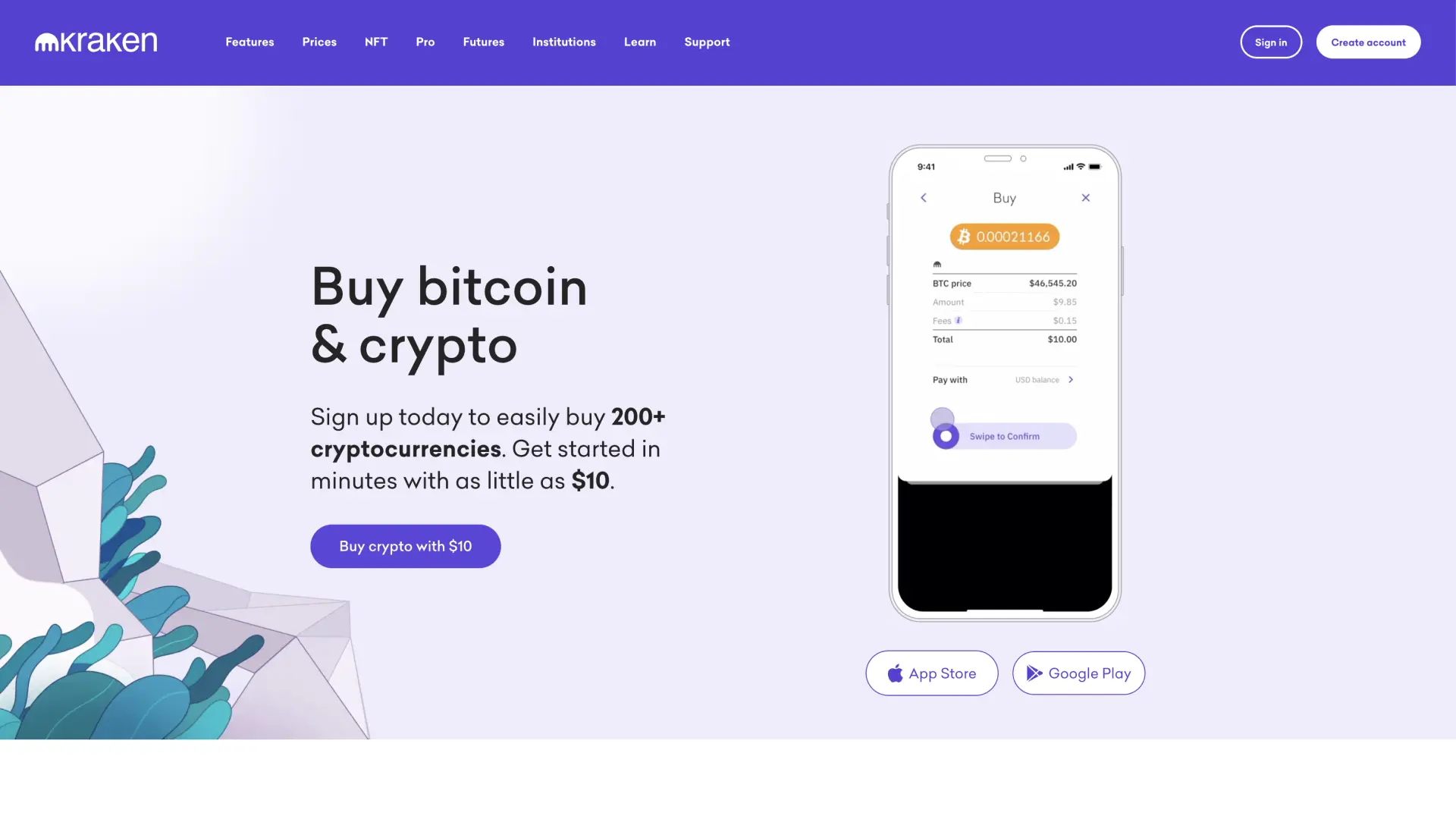
Overview: Kraken is a well-established cryptocurrency exchange that was founded in 2011 and is headquartered in San Francisco, California. It is a centralized exchange that is regulated in the US and operates in over 190 countries worldwide.
Tradable coins: Kraken supports over 70 cryptocurrencies, including Bitcoin, Ethereum, Ripple, and Litecoin.
Fees: Kraken charges a maker-taker fee structure that ranges from 0% to 0.26%, depending on the trading volume. Kraken also charges a small fee for cryptocurrency deposits and withdrawals.
Pros:
- Wide range of altcoins
- Low fees compared to other exchanges
- High liquidity
Cons:
- Complex interface for beginners
- Slow customer support
Visit Kraken
3. Gemini Exchange Review
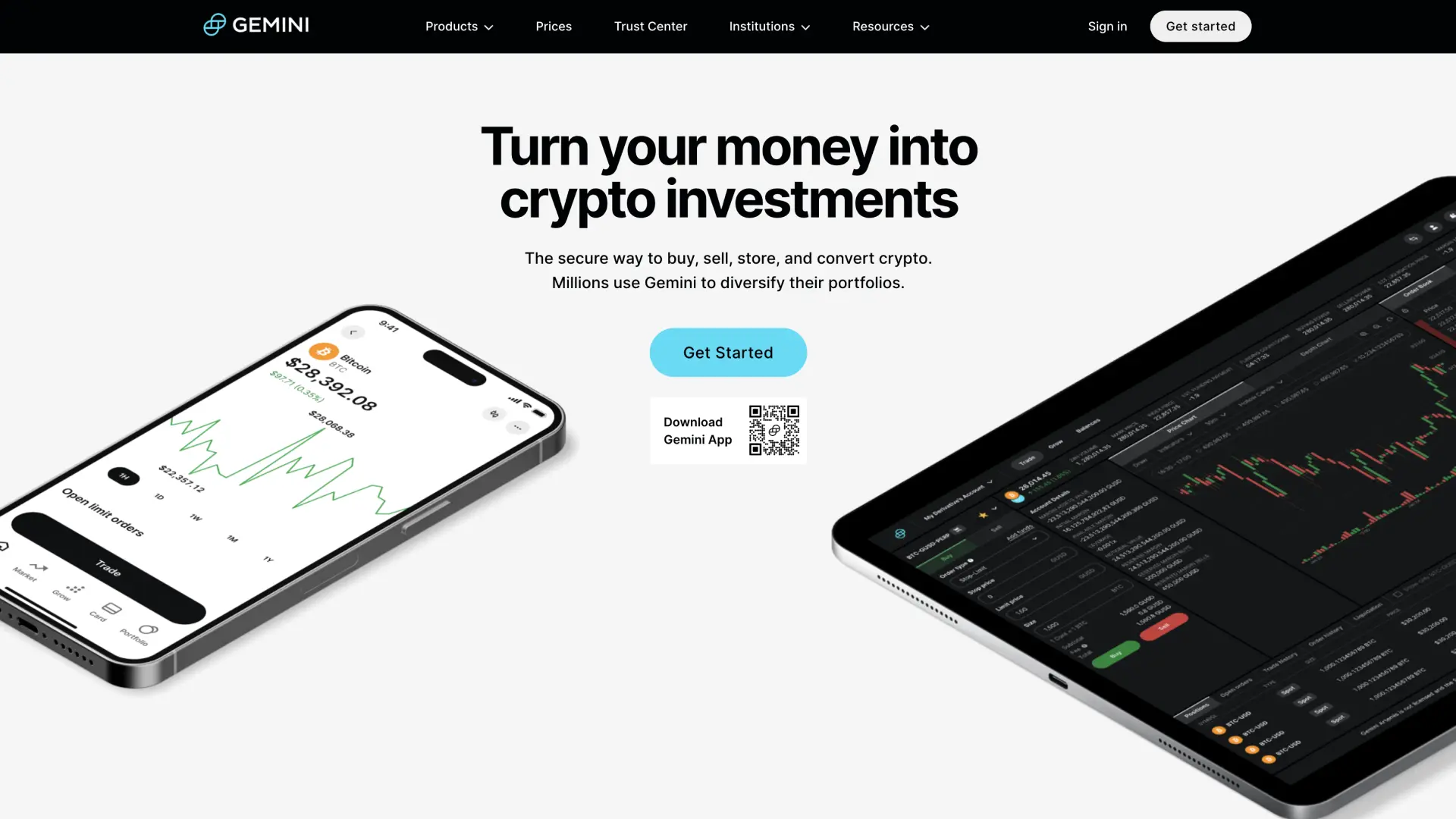
Overview: Gemini is a well-established cryptocurrency exchange that was founded in 2014 and is headquartered in New York City, New York. It is a centralized exchange that is regulated in the US and operates in over 50 countries worldwide.
Tradable coins: Gemini supports over 40 cryptocurrencies, including Bitcoin, Ethereum, Litecoin, and Bitcoin Cash.
Fees: Gemini charges a maker-taker fee structure that ranges from 0.35% to 0.25%, depending on the trading volume. Gemini also charges a small fee for cryptocurrency deposits and withdrawals.
Pros:
- Strong security measures
- High liquidity
- User-friendly interface
Cons:
- Limited selection of altcoins
- High fees compared to other exchanges
Visit Gemini
4. Robinhood Crypto Exchange Review
Overview: Robinhood Crypto is a well-established cryptocurrency exchange that was founded in 2013 and is headquartered in Menlo Park, California. It is a centralized exchange that is regulated in the US and operates in over 50 states.
Tradable coins: Robinhood Crypto supports 7 cryptocurrencies, including Bitcoin, Ethereum, Dogecoin, and Litecoin.
Fees: Robinhood Crypto charges no fees for cryptocurrency purchases, sales, or transfers.
Pros:
- User-friendly interface
- No fees for cryptocurrency transactions
- Strong security measures
Cons:
- Limited selection of cryptocurrencies
- No support for cryptocurrency withdrawals
Visit Robinhood Crypto
5. Binance.US Exchange Review
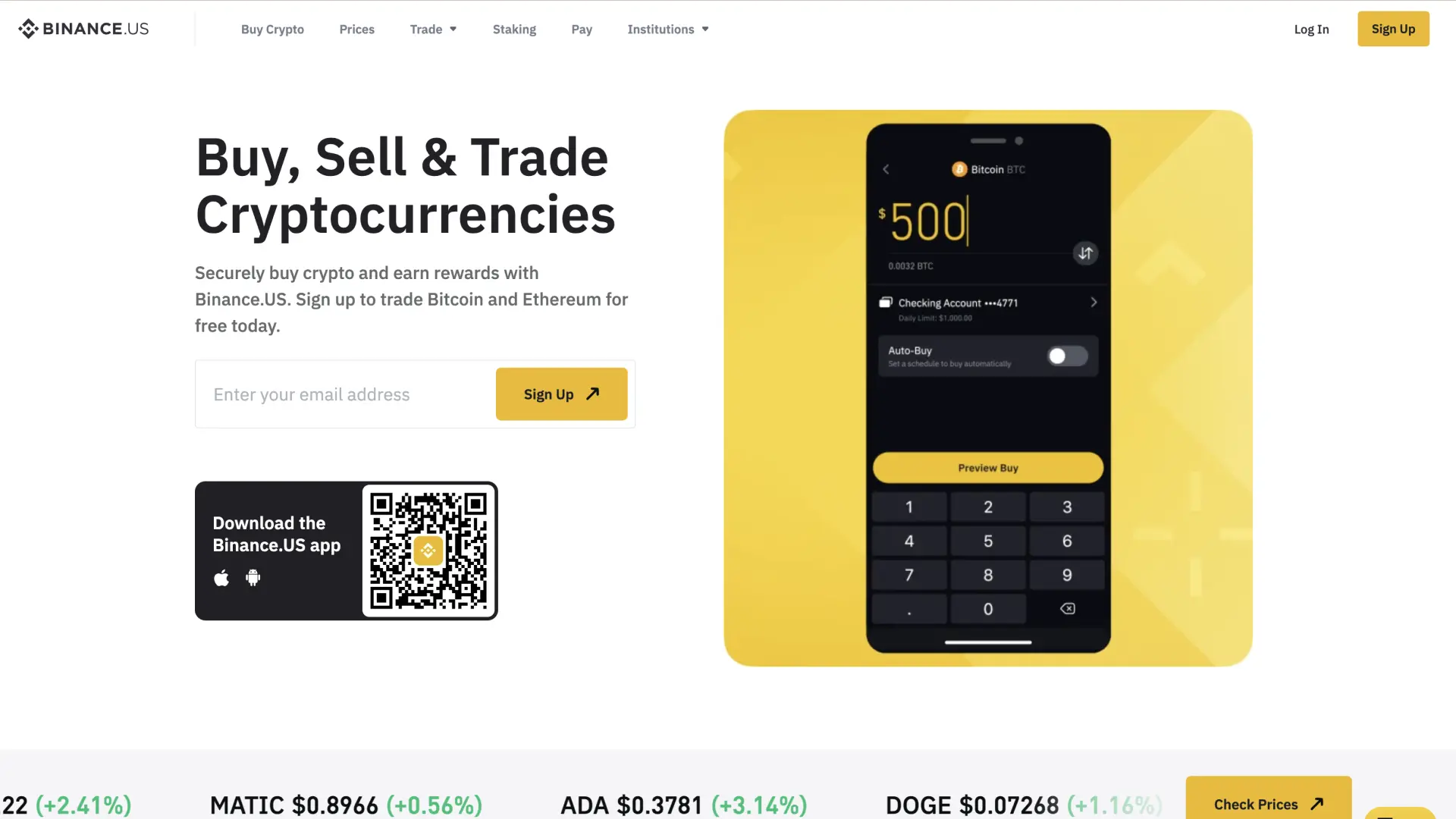
Overview: Binance.US is a well-established cryptocurrency exchange that was founded in 2019 and is headquartered in San Francisco, California. It is a centralized exchange that is regulated in the US and operates in over 40 states.
Tradable coins: Binance.US supports over 50 cryptocurrencies, including Bitcoin, Ethereum, Ripple, and Litecoin.
Fees: Binance.US charges a maker-taker fee structure that ranges from 0.1% to 0.5%, depending on the trading volume. Binance.US also charges a small fee for cryptocurrency deposits and withdrawals.
Pros:
- Low fees compared to other exchanges
- Wide range of altcoins
- High liquidity
Cons:
- Limited customer support
- Complex interface for beginners
Visit Binance.US
6. Crypto.com Exchange Review

Overview: Crypto.com is a well-established cryptocurrency exchange that was founded in 2016 and is headquartered in Hong Kong. It is a centralized exchange that is regulated in multiple jurisdictions and operates in over 90 countries worldwide.
Tradable coins: Crypto.com supports over 100 cryptocurrencies, including Bitcoin, Ethereum, Ripple, and Litecoin.
Fees: Crypto.com charges a maker-taker fee structure that ranges from 0.04% to 0.4%, depending on the trading volume. Crypto.com also charges a small fee for cryptocurrency deposits and withdrawals.
Pros:
- Low fees compared to other exchanges
- Cashback rewards for using the exchange
- User-friendly interface
Cons:
- Limited selection of altcoins
- Slow customer support
Visit Crypto.com
7. eToro Exchange Review
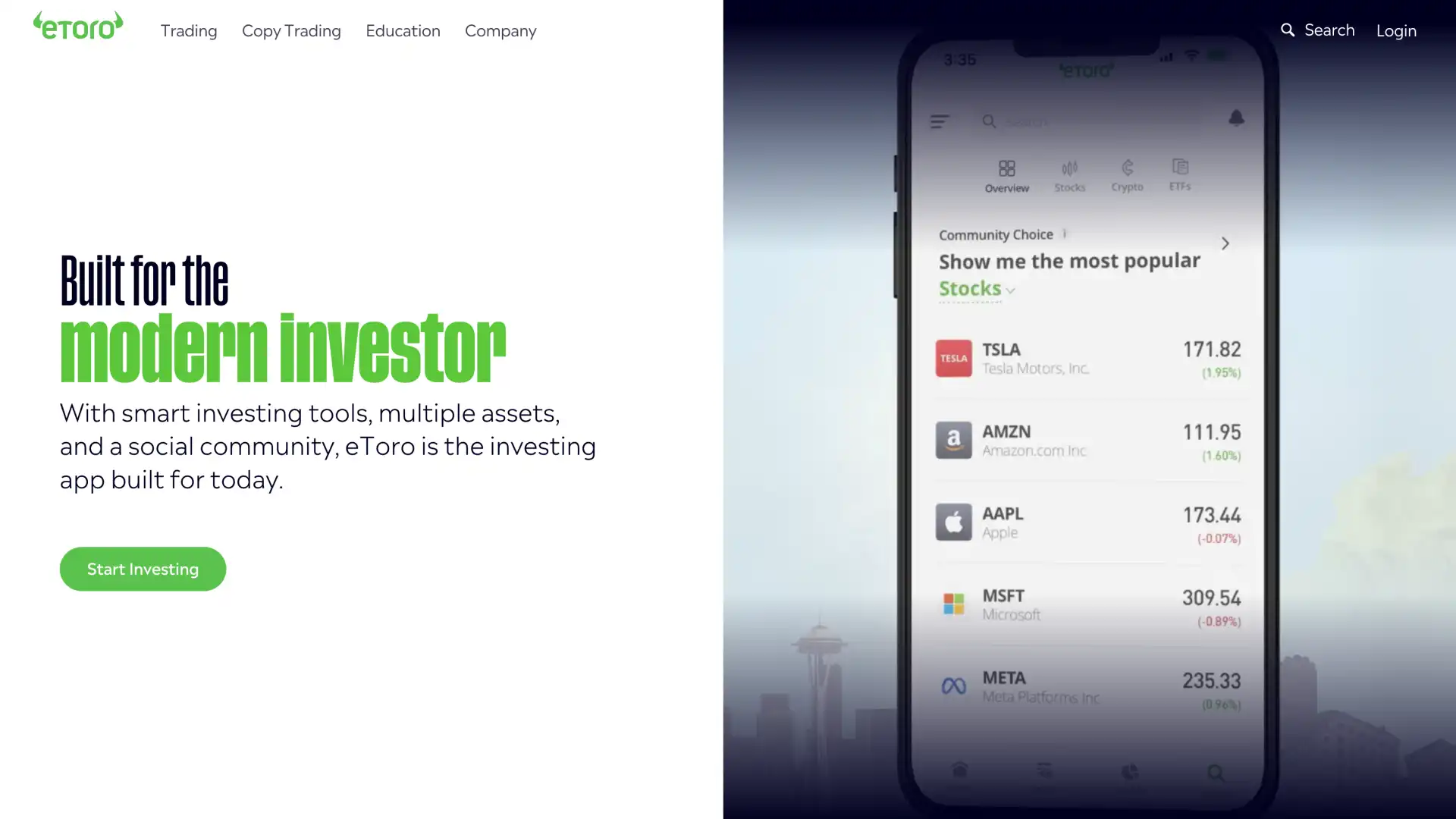
Overview: eToro is a well-established cryptocurrency exchange that was founded in 2007 and is headquartered in Tel Aviv, Israel. It is a centralized exchange that is regulated in multiple jurisdictions and operates in over 140 countries worldwide.
Tradable coins: eToro supports over 20 cryptocurrencies, including Bitcoin, Ethereum, Ripple, and Litecoin.
Fees: eToro charges a spread fee that ranges from 0.75% to 5%, depending on the cryptocurrency. eToro also charges a small fee for cryptocurrency deposits and withdrawals.
Pros:
- User-friendly interface
- Social trading features
- Wide range of trading instruments
Cons:
- High fees compared to other exchanges
- Limited selection of altcoins
Visit eToro
8. Poloniex Exchange Review
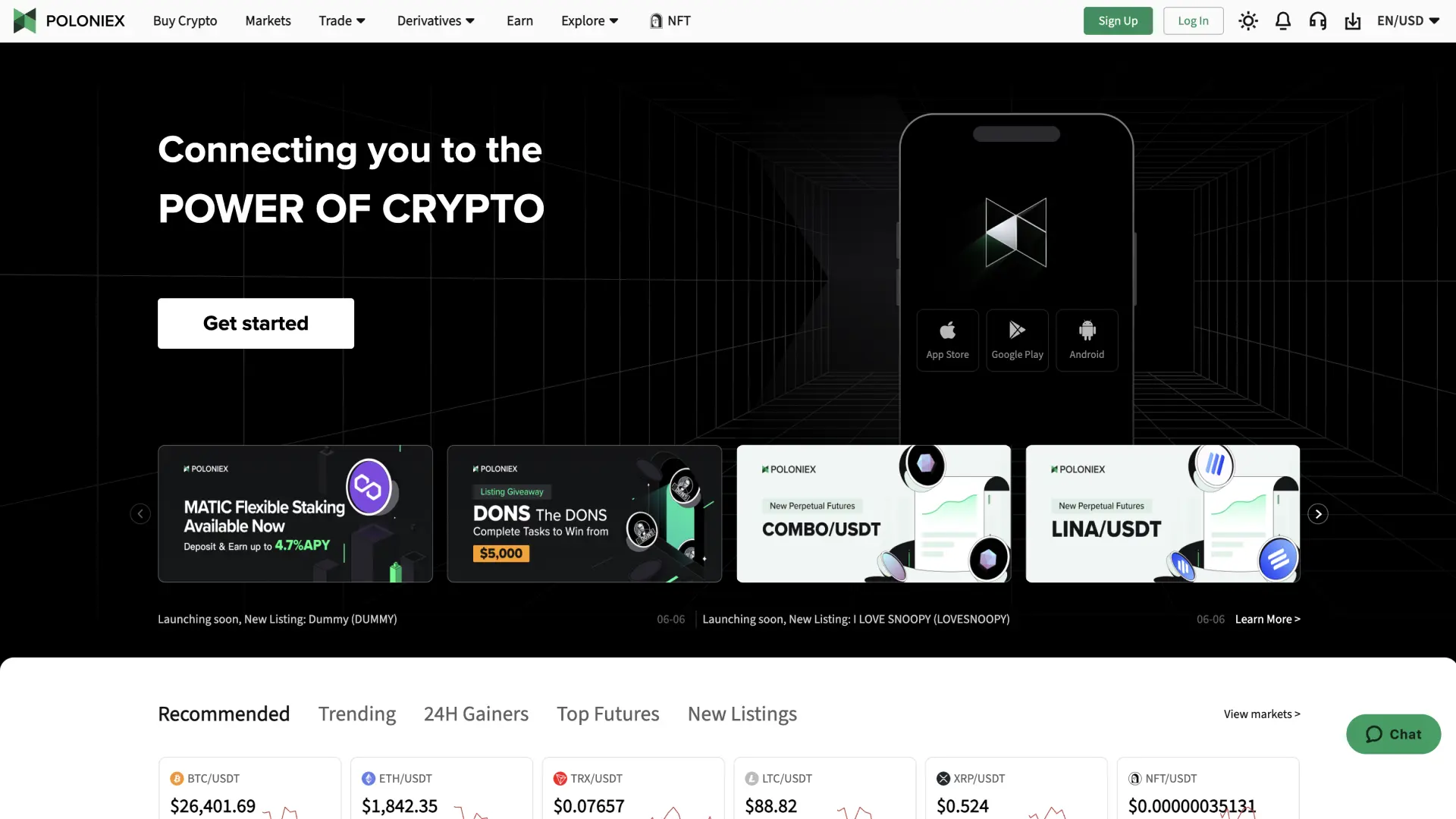
Overview: Poloniex is a well-established cryptocurrency exchange that was founded in 2014 and is headquartered in Wilmington, Delaware. It is a centralized exchange that is regulated in the US and operates in over 100 countries worldwide.
Tradable coins: Poloniex supports over 70 cryptocurrencies, including Bitcoin, Ethereum, Ripple, and Litecoin.
Fees: Poloniex charges a maker-taker fee structure that ranges from 0% to 0.125%, depending on the trading volume. Poloniex also charges a small fee for cryptocurrency deposits and withdrawals.
Pros:
- High liquidity
- Wide range of altcoins
- Strong security measures
Cons:
- Complex interface for beginners
- Slow customer support
Visit Poloniex
9. Uphold Exchange Review
Overview: Uphold is a well-established cryptocurrency exchange that was founded in 2014 and is headquartered in Charleston, South Carolina. It is a centralized exchange that is regulated in the US and operates in over 180 countries worldwide.
Tradable coins: Uphold supports over 30 cryptocurrencies, including Bitcoin, Ethereum, Ripple, and Litecoin.
Fees: Uphold charges a spread fee for cryptocurrency purchases and sales that varies based on the asset being traded and market conditions. For US customers looking to trade Bitcoin or Ethereum, the spread fee is between 0.8% and 1.2% of the market value of the trade.
For other parts of the world, the spread fee is typically around 1.8%. Uphold charges a higher spread fee for lower-liquidity cryptocurrencies like Ripple or Dogecoin, and during periods of market stress or high trading volumes. Uphold also charges a network fee for withdrawals to external crypto wallets, but that fee is charged by the cryptocurrency network, not Uphold.
Pros:
- No deposit, withdrawal, or trading fees
- Valuable educational content
- User-friendly interface
Cons:
- Variable spread fees can be high compared to other exchanges
- Limited selection of cryptocurrencies
Visit Uphold
10. Gate.io Exchange Review
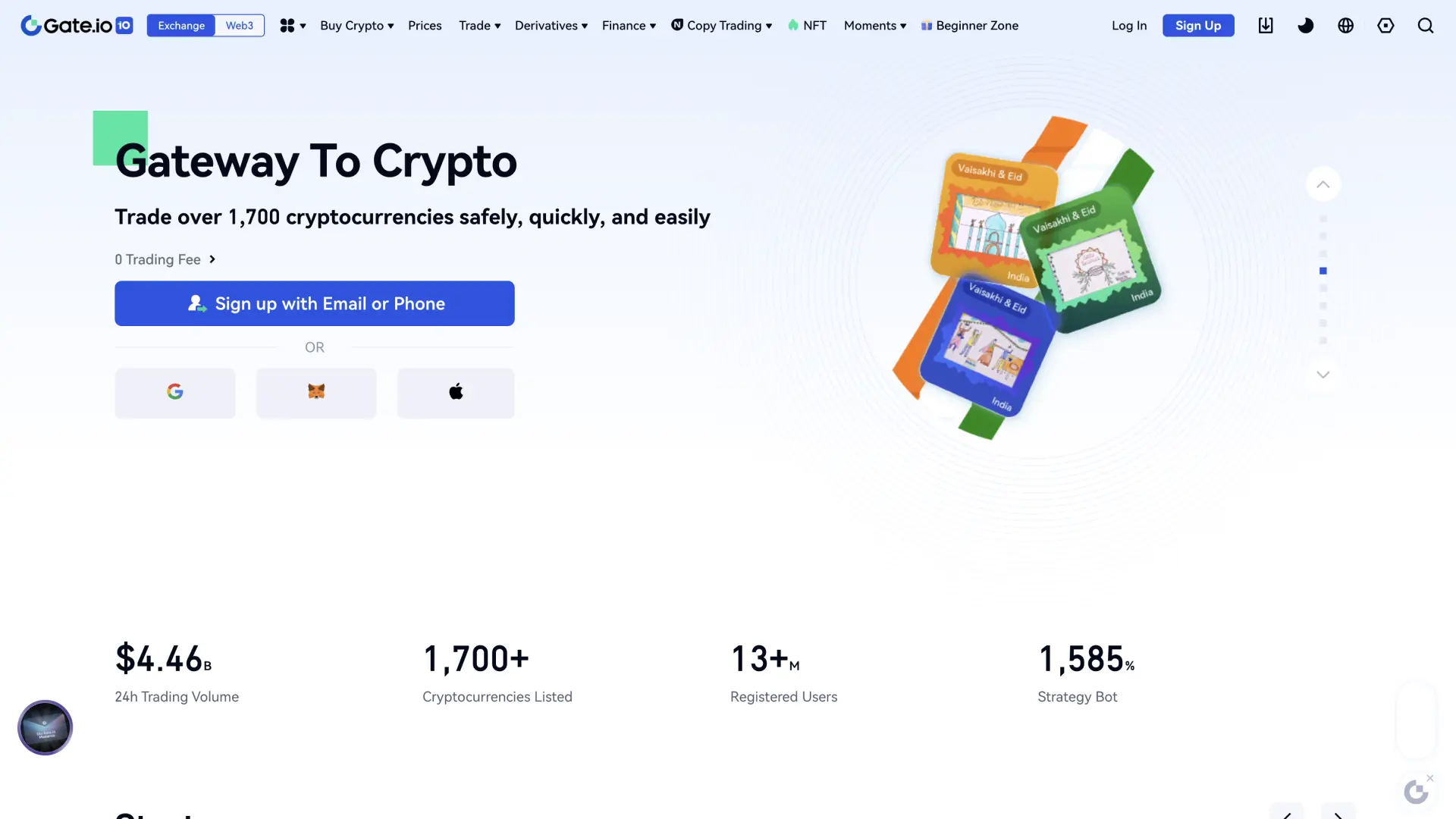
Overview: Gate.io is a well-established cryptocurrency exchange that was founded in 2017 and is headquartered in the Cayman Islands. It is a centralized exchange that operates in over 190 countries worldwide.
Tradable coins: Gate.io supports over 500 cryptocurrencies, including Bitcoin, Ethereum, Ripple, and Litecoin.
Fees: Gate.io charges a maker-taker fee structure that ranges from 0.2% to 0.1%, depending on the trading volume. Gate.io also charges a small fee for cryptocurrency deposits and withdrawals.
Pros:
- Wide range of cryptocurrencies
- Low fees compared to other exchanges
- High liquidity
Cons:
- Limited customer support
- Complex interface for beginners
Visit Gate.io
You May Also Like
-
Best Crypto & Bitcoin Exchanges
-
Best Crypto & Bitcoin Exchanges in the USA
-
Best Tether Exchanges
-
Best USD Coin Exchanges
-
Best Crypto & Bitcoin Exchanges Canada
-
The Best Crypto Exchanges in the UK
-
Best Binance Coin Exchanges
-
Best XRP Exchanges
-
Best Cardano Exchanges
-
Best Litecoin Exchanges
-
Best Tron Exchanges
-
Best Polygon Exchanges
-
Best Avalanche Exchanges
-
Best Shiba Inu Exchanges
- Show More

Disclaimer: Investing in cryptocurrencies carries significant risk. Values are highly volatile. Never invest more than you can afford to lose. This site does not provide financial advice. Act based on your own research and consult with a financial professional before making decisions. Don’t invest unless you’re prepared to lose all the money you invest.
How To Pick A Crypto Exchange
Choosing your cryptocurrency exchange can seem daunting. You want to make sure your hard-earned money is safe and you're getting the best deal. Here are key points to consider when looking for the best bitcoin and cryptocurrency exchanges in New York.
Assessing coin availability
Not all exchanges offer the same selection of digital assets. When you select a crypto exchange, a good starting point is to check the variety of coins available. A broader selection of coins can open up more trading opportunities.
Make sure the exchange you're considering offers the specific cryptocurrencies you want to buy.
Checking the liquidity
An exchange's liquidity refers to the ability to quickly buy or sell without significantly affecting the price. It is another vital factor. High liquidity often indicates a healthier market and enables smoother transactions.
Websites like CoinMarketCap can help you verify an exchange's trading volume. The higher the trading volume, the better.
Comparing the costs
Be aware of the fee structures when comparing popular crypto exchanges. These can include costs for deposits, trades, and withdrawals. Each exchange may have different rates, so it's important to understand these before engaging in any transactions.
Prioritizing security
Crypto exchanges can be prone to security breaches, making security a primary concern. Look for exchanges that use security measures such as two-factor authentication and biometric logins. The safety of your digital assets should always be a top priority.
Exploring educational resources
Educational resources are valuable for both beginners and seasoned traders. These resources help you understand the volatile crypto market and make better decisions. There are plenty of different types of resources available, which include:
- Cryptocurrency basics: Resources covering blockchain, Bitcoin, Ethereum, and other essential concepts.
- Trading strategies: Guides providing trading tips and strategies.
- Market analysis: Resources offering insights into market trends.
- Additional resources: These include blogs, simulation trading, videos, and more.
It's important to verify the accuracy of these resources and ensure they're up-to-date. They should be easily accessible and understandable, even for beginners.
Selecting a cryptocurrency exchange requires careful consideration. There is a wide variety of online platforms available in New York. Taking these points into account can help you find an exchange that suits your trading needs.
Licensing and Regulations for Crypto Exchanges in New York
Trading in cryptocurrencies involves a steep learning curve. In this sense, one of the most important lessons is the role of licensed exchanges. A licensed crypto exchange operates within established regulations. It offers you a safety net against the potential risks associated with unregulated operators.
This license is proof that the exchange follows strict standards aimed at preventing fraud. It ensures a secure environment for you to trade your digital assets. It also provides an essential layer of protection in the often unpredictable world of cryptocurrency trading.
Understanding the regulatory framework
The state of New York has its own regulatory landscape for cryptocurrency exchanges, which is primarily governed by the BitLicense system . This system is unique to New York, setting it apart from other states and adding an extra layer of security for the state's crypto traders.
A fully compliant exchange provides a fair, secure, and regulated platform for trading.
Key considerations for regulators
Regulatory bodies pay close attention to several key factors when issuing licenses to crypto exchanges. Here's a more in-depth look at what they consider.
Addressing anti-money laundering and countering terrorist financing
Regulators place significant emphasis on Anti-Money Laundering and Counter-Terrorist Financing requirements. They need to ensure that exchanges have comprehensive systems in place to detect, prevent, and report potential illegal activities.
Compliance with AML and CTF policies helps to maintain the integrity of the crypto trading environment and protects you, the trader, from inadvertent involvement in unlawful transactions.
Implementing know-your-customer procedures
Another key component for license approval is the Know-Your-Customer procedure. Exchanges are required to collect and verify identity information from each of their customers.
This process serves as a safeguard against identity theft and various forms of fraud. It also makes the trading environment safer for everyone. Though it might mean a slightly longer sign-up process for you, it’s a worthwhile trade-off for improved security and peace of mind.
Prioritizing security and risk management
Regulators also expect crypto exchanges to show strong capability in managing security risks. Exchanges must show robust security infrastructure, effective risk management policies, and the ability to swiftly respond to potential threats. This translates into confidence that your funds and transactions are secure when you trade crypto on these platforms.
Licenses and regulations play an indispensable role in creating a safe and secure crypto exchange, especially in New York. While the regulatory landscape may seem overwhelming at first glance, each rule and regulation exists to protect you, the trader.
So, always choose to trade on licensed, regulated exchanges for a more secure and worry-free crypto experience.
What Products Are Available On The Crypto Exchange?
Most exchanges go beyond simple buy-sell functionalities. Instead, they offer an array of tools that aid in efficient digital asset management.
Expansive trading platforms and tools
Crypto exchanges feature a diverse range of tools. They are designed to cater to various levels of trading expertise. Some exchanges even have platforms tailored for professional trading.
These platforms provide features. They include advanced order types, customizable chart analysis tools, and deep insights into order books. Additionally, they allow traders to make strategic, data-driven decisions. Thanks to them, you can carry out trades swiftly and accurately.
Spot, margin, and futures trading explained
Many top-notch crypto exchanges offer spot, margin, and futures trading. Spot trading entails direct buying or selling of cryptocurrencies at the current market price. Margin trading enables traders to amplify their trades using borrowed funds. It increases potential profits and risk alike.
Futures trading allows traders to agree on a future price for a specific cryptocurrency. It is a risk management strategy against potential market volatility. These varied trading mechanisms cater to seasoned traders.
Secure crypto storage
Regarding crypto storage, exchanges offer a myriad of options to suit your needs. One such popular choice is self-hosted crypto wallets, giving you complete control over your private keys.
Other options range from online wallets ensuring quick access, to offline one focusing on bolstering security. Depending on your accessibility needs and security concerns, you can opt for a storage solution that best fits your criteria.
Tailored services for individual users
Crypto exchanges don't limit their services to mere trading. Indeed, they offer a wide array of features for individual users. These include earning crypto rewards and borrowing cash using Bitcoin as collateral. You can also trade unique digital assets like Non-Fungible Tokens (NFTs).
Empowering enterprises
Crypto exchanges also present an extensive suite of services catering specifically to businesses. These services can include institutional trading solutions, and options to accept crypto payments. They can also include opportunities to list new assets on the exchange. Aside from this, you can gain access to futures markets for advanced trading strategies.
With these business-centric services, companies can tap into the benefits of cryptocurrencies. They can seamlessly integrate them into their conventional operations.
The best crypto and bitcoin exchanges in New York offer a comprehensive range of products and services. They assist individuals and businesses to interact effectively with the dynamic world of digital assets.
Familiarizing yourself with these offerings is the key to a successful cryptocurrency trading and management journey.
What Payment Methods Are Accepted?
Understanding the various payment methods that crypto exchanges accept is an essential part of your journey in the world of digital assets. Each method has its benefits and drawbacks. Knowing about them helps make informed decisions while conducting transactions.
PayPal
PayPal, a renowned online wallet, is widely accepted in many crypto exchanges. By connecting your PayPal account to your exchange, you can deposit, store, transfer, and withdraw funds easily.
Benefits of using PayPal include its efficiency and the two-factor authentication. It enhances the security of your transactions.
Using credit and debit cards for crypto transactions
Major credit and debit card providers like Visa and MasterCard are available on most crypto exchanges. These cards allow you to directly transfer money from your bank account to the exchange. They come with an additional layer of security features. For instance, with big players such as these you have the benefit of processes such as Verified by Visa.
Bank transfers
In regions where credit card usage is challenging, bank transfers prove to be a reliable alternative. Instant processing of these transfers is available in certain scenarios. It can be beneficial for time-sensitive transactions.
Digital tokens
Crypto-only platforms often allow the use of digital tokens as a payment method. Transactions using these tokens come with several security benefits. These include decentralization, cryptographic security, and anonymous transactions. It's an ideal method for those heavily invested in the crypto ecosystem.
The Fee factor
It's important to know that your chosen payment method could influence the fees you incur. For instance, deposits using digital coins are usually the most cost-effective method. In contrast, specific payment methods, such as PayPal, might involve additional withdrawal fees.
New York's best crypto and bitcoin exchanges provide a selection of payment methods, each with its unique features. Understanding these methods is key to navigating the complex world of cryptocurrency exchanges effectively.
Different Types of Crypto exchanges
Exchanges can be categorized as centralized exchanges (CEX), decentralized exchanges (DEX), and hybrid exchanges. Each of them comes with unique operational dynamics, advantages, and drawbacks.
Centralized Exchanges (CEX)
Centralized exchanges, often abbreviated as CEXs, resemble traditional financial exchanges. They provide a platform for cryptocurrency trading, acting as intermediaries between buyers and sellers. You deposit your funds directly into the exchange, which then facilitates trades on your behalf.
The primary strength of CEXs lies in their high trading volumes, allowing for better liquidity. They also offer fast transaction speeds, and often support a vast selection of cryptocurrencies. That gives traders many options to diversify their digital assets.
Aside from this e, many centralized exchanges have intuitive, user-friendly interfaces. They make them a favorable choice for beginners entering the crypto market.
However, the centralized nature of these exchanges also presents certain challenges. Being under a single authority, they can become targets for cyberattacks. That puts user funds and information at risk.
Decentralized Exchanges (DEX)
Decentralized exchanges , or DEXs, offer a unique way of trading cryptocurrencies. Unlike CEXs, they don't rely on a central authority. Transactions are facilitated through smart contracts on a blockchain. That enables direct peer-to-peer trading.
The main advantage of using a DEX is the increased privacy it offers. You maintain control over your private keys and personal information. That mitigates the risk of large-scale data breaches. DEXs provide an escape from heavy regulatory scrutiny that centralized exchanges often fall under.
The flip side of using DEXs includes lower liquidity and potentially slower transaction speeds. The technology behind these exchanges is still evolving. The interface may not be as friendly to new users as centralized exchanges’. There can be a steep learning curve involved when transitioning from CEXs to DEXs.
Hybrid Exchanges
Hybrid exchanges are a newer breed of platforms. They aim to harness the advantages of centralized and decentralized exchanges. Their goal is to blend the security, control, and privacy features of DEXs with the liquidity, speed, and ease of use of CEXs.
These platforms offer potential benefits, like user-controlled funds and less susceptibility to large-scale hacks. Simultaneously, they aim to provide high liquidity and faster transaction speeds.
Hybrid exchanges are still a more or less unknown factor. As you’d expect, there are many questions about the way they work, and how reliable they are. Users looking to explore these platforms should approach with caution, making sure to thoroughly research their chosen hybrid exchange before investing.
Choosing an exchange from among these types, whether centralized, decentralized, or hybrid, should be a decision based on personal trading requirements and risk tolerance.
Factors such as privacy, speed, liquidity, and learning curves all play a significant role in making this choice.
Writer’s Tip: Try A Few Options
Diversifying your crypto trading platforms can offer several benefits. It not only helps you become more versatile as a trader, but also spreads your risk. Below, we discuss why trying out different exchanges can be a smart move.
The perks of diversity
When you experiment with various old and new crypto exchanges, you expose yourself to different user interfaces. Each crypto exchange, whether centralized, decentralized, or hybrid, offers a unique trading experience.
You'll meet different layouts, features, and tools across platforms. As you navigate these diverse interfaces, it will become easier to handle a variety of trading environments. This flexibility can make you a more competent and confident trader.
Expanding your trading to multiple exchanges allows you to invest in a wider range of cryptocurrencies. Some platforms may list certain digital assets that others do not. That gives you the opportunity to diversify your crypto portfolio.
A diversified portfolio can provide better returns and reduce potential risks. It's the old adage of not putting all your eggs in one basket - but applied to the crypto world.
Risk mitigation through multiple exchanges
Trading through multiple exchanges reduces the risk of total loss if one exchange is compromised. Crypto exchanges, like any other online platforms, tend to suffer security breaches.
If you only use one exchange and this is compromised, you could potentially lose all your digital assets. If you spread your investments across several exchanges, the potential damage can be mitigated.
Using multiple crypto exchanges can make you more versatile, provide opportunities to diversify your investments, and offer protection against the total loss of assets. Consider the pros and cons of each exchange. Remember - being comfortable with your chosen platforms is key to successful trading.
How Bitcoin And Crypto Exchanges in New York Work
Exchanges are essentially web-based platforms that serve as the main junction for traders of digital assets such as bitcoin. Here’s how they work.
Crypto Marketplace – Here’s How It Works
At its most basic, we can compare cryptocurrency exchanges to a bustling marketplace. Just as in a traditional bazaar, transactions take place when buyers and sellers agree on a price.
But instead of tangible goods, the exchanges deal in digital currencies. You can buy, sell, or trade a wide range of cryptocurrencies. Some common trading pairs involve fiat currencies like the US dollar. Others might be purely between different types of digital assets.
Operation of a Crypto Exchange
The operational mechanisms of crypto exchanges are rooted in the basic economic principle of supply and demand. In the simplest terms, potential buyers indicate the prices they are willing to pay for a particular cryptocurrency via 'bids'.
On the other hand, sellers set 'asks', representing the prices at which they are willing to part with their digital assets. Whenever a bid aligns with an ask, voila - you have a transaction! This perpetual process of matching bids with asks gives rise to the ever-changing prices you see on a crypto exchange's interface.
The Role of Crypto Exchanges in New York
In the heart of the financial world, New York, crypto exchanges have found a key role to play. They serve as the bedrock of crypto transactions.
These exchanges boast user-friendly interfaces, good security features, and efficient customer service. They also provide an inclusive trading environment for both beginners and experienced traders.
The world of digital assets pivots around crypto exchanges. These not only facilitate the exchange of digital assets, but also play a key role in establishing the relative value of different cryptocurrencies.
A Beginner’s Guide To Buying Bitcoin
To get started in the world of cryptocurrency, many choose Bitcoin as their first digital asset. But the process of buying Bitcoin might appear complex at first. In this guide, we'll break down the process step by step, so you can buy Bitcoin with confidence.
Steps to buying Bitcoin
When it comes to buying Bitcoin, it's important to follow these steps:
Choose a platform
Start by selecting a reliable crypto exchange. These exchanges, including top ones like Coinbase, Kraken, and Gemini, offer you a secure platform to buy and sell Bitcoin. They are regulated and licensed to operate, especially in New York, with strict crypto regulations.
Pick a payment method
You can fund your purchases through various means, such as bank transfers, credit cards, debit cards, or PayPal. Each exchange will have different payment options available, so make sure to choose one that suits your needs.
Set up your payment method
Link your chosen payment method to your account on the crypto exchange. This process involves providing the necessary details of your payment option.
Place an order
Once your payment method is set up, you can place an order to buy Bitcoin. You can choose the amount you want to buy based on your budget and investment plan.
Secure your Bitcoin
After your purchase, your Bitcoin will be stored in a digital wallet. This could be an online wallet provided by the exchange or an offline wallet for added security. You can also trust the exchange with a custodial wallet, or go for a non-custodial option.
Other Methods to Buy Bitcoin
Crypto exchanges aren't the only way to buy Bitcoin. Peer-to-peer transactions are another option. You can buy directly from other Bitcoin owners. This process requires trust and often uses escrow services for security. Alternatively, you could buy Bitcoin gift cards, which you can redeem on specific platforms for Bitcoin.
So You’ve Bought Bitcoin, What To Do Next?
Once you've bought your first Bitcoin, it might be a little unclear as to what the next steps should be. Let's walk through some key points you should consider once you've made the first leap into the world of cryptocurrency.
Securing your Digital Assets
The first thing you should do after buying Bitcoin is ensure it's secure. Leaving your Bitcoin on the exchange for too long can expose it to potential security risks. To maximize the safety of your investment, consider transferring your Bitcoin to a cold (offline) wallet. Offline wallets allow for secure storage away from potential online threats, making sure that your Bitcoin is safe.
Exploring Use Cases
Now that you have your Bitcoin, you have several options for what to do with it. You could choose to "hodl ". It is a term used in the crypto community to mean holding onto Bitcoin as a long-term investment.
Alternatively, you could use your Bitcoin for purchases at businesses that accept it, or invest it in various blockchain projects. If you're feeling adventurous, you could even try staking or trading your Bitcoin on a crypto trading platform.
Building a portfolio
When it comes to investing, it's always smart to diversify. If you've only invested in Bitcoin so far, consider purchasing at least four other types of coins.
By investing in a variety of cryptocurrencies, you reduce the risk associated with putting all your funds into one asset.
Staying Informed
Finally, staying informed about market trends and regulatory changes is vital. Keep an eye on the latest news from New York, as the state's stringent regulations often influence the crypto market.
Final Word
In this guide, we've embarked on a journey to navigate the landscape of cryptocurrency exchanges in New York. From Coinbase's overall excellence to Gemini's robust security measures and Binance.US's low fees, we've highlighted the unique features of each exchange.
Choosing the right exchange involves considering factors like coin availability, liquidity, fees, security measures, and available educational resources. Moreover, understanding the licensing and regulations in New York provides crucial insight into ensuring a secure and regulated trading environment.
Frequently Asked Questions
What services do crypto and Bitcoin exchanges Offer?
Crypto and Bitcoin exchanges primarily offer a platform trading cryptocurrencies. These platforms often provide various services. They could include market data, different trading pairs, secure wallets to store your assets, educational resources to understand cryptocurrency trading, and customer support.
Some exchanges also offer advanced trading features. They include margin trading, futures, and staking services.
How much money do I need to use a crypto and Bitcoin exchange?
The amount of money you need to start trading on a cryptocurrency exchange can vary widely. Some exchanges allow you to start trading with as little as $10.
It is important to note that investing in cryptocurrencies involves risk, and you should only invest what you can afford to lose. Be sure to check the minimum deposit requirements on the specific exchange you choose, as these can vary. It’s also recommended to consider transaction fees when deciding how much to invest.
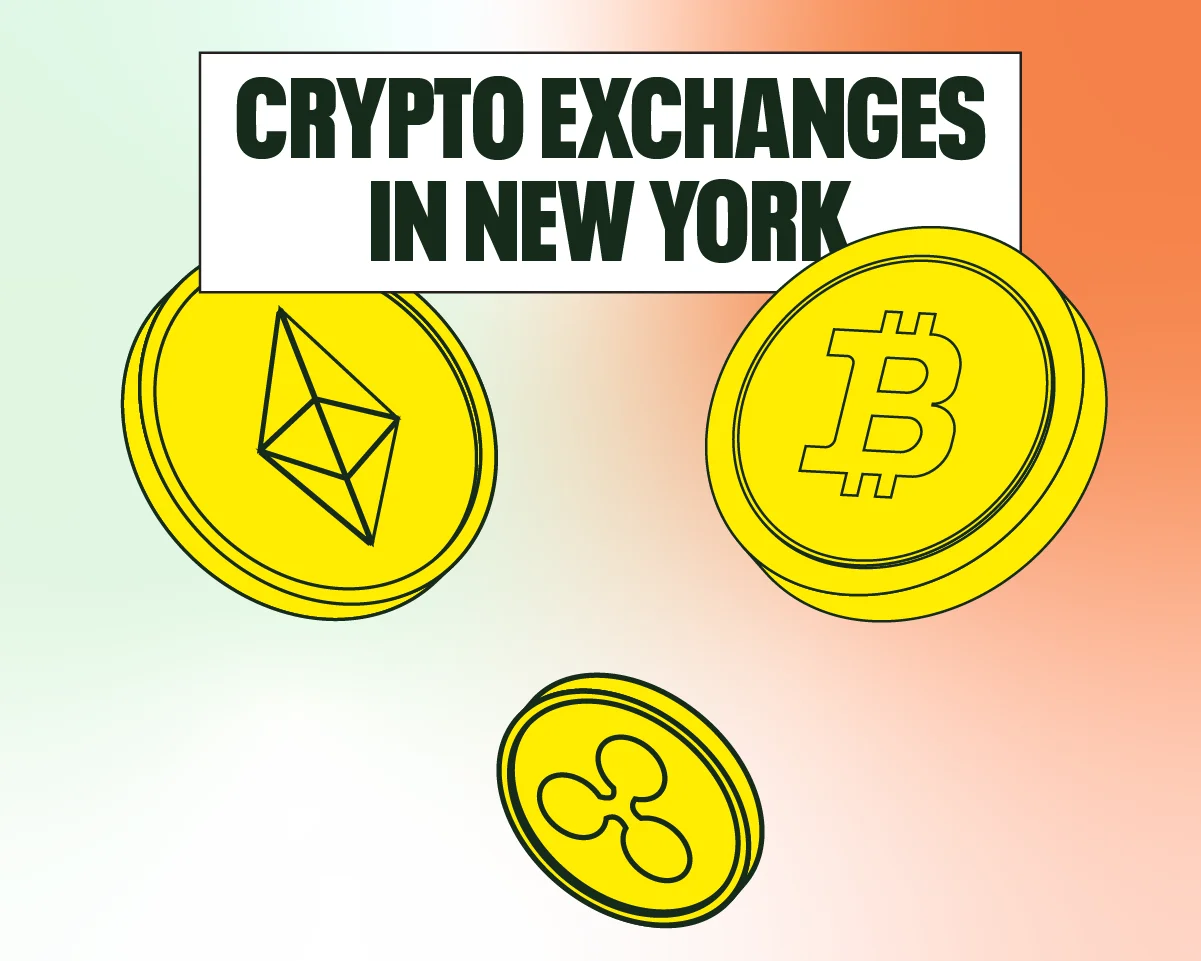
.png)